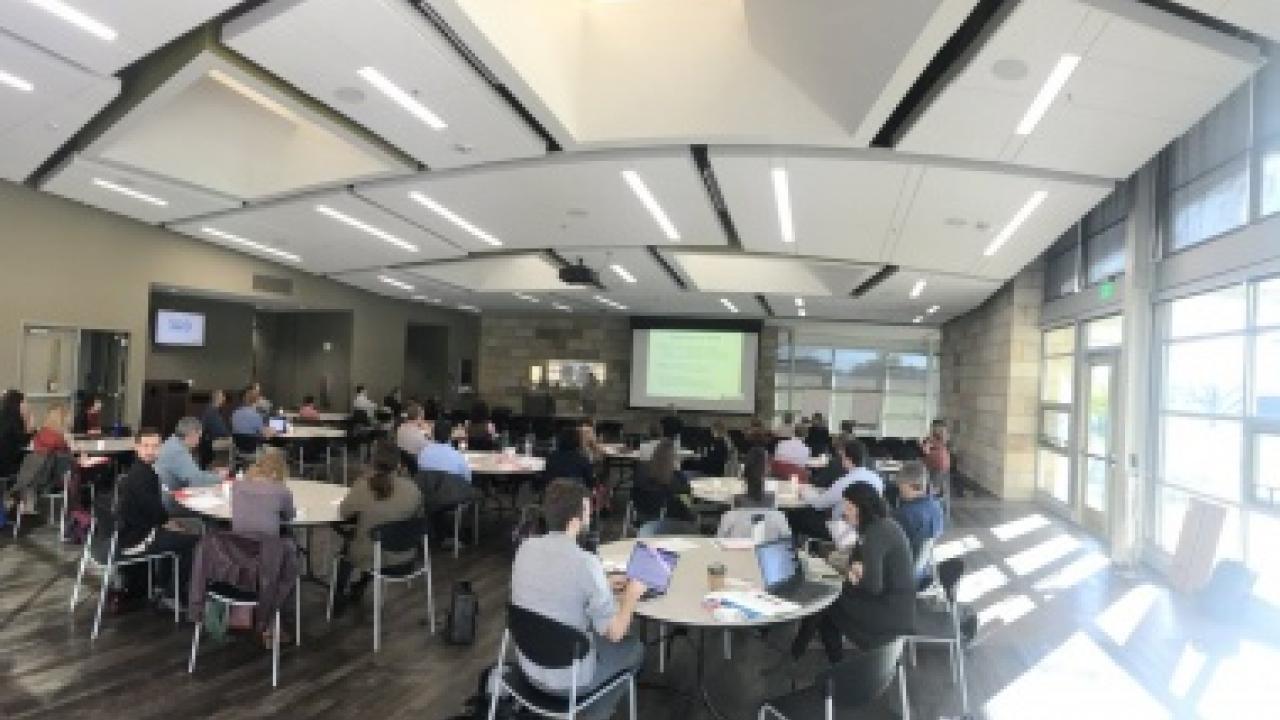
The Sustainable Groundwater Management Act Governance Conference: Research and Practice
The Center for Environmental Policy and Behavior and the Department of Water Resources organized a conference to connect researchers and practitioners working on the Sustainable Groundwater Management Act (SGMA) in California. The conference was held on February 6th, 2018 at the University of California Davis and assembled 55 social science researchers as well as practitioners from in and out of the state. The main objective of the conference was to strengthen collaboration across research teams as well as between researchers and practitioners to increase understanding on governance processes and to bridge the science-policy divide in order to support the creation of effective governance institutions with SGMA. The conference was motivated by the Center and the Department of Water Resources efforts to make information more accessible and foster collaboration.
The full document uploaded in this website contains the proceedings from this day. Document highlights include:
Common governance research themes: The SGMA research being conducted by in- and out-of-state research teams can be categorized into five common themes: (1) resource economics, (2) institutional design, (3) intersections between natural and social sciences, (4) stakeholder perceptions, and (5) inclusion of underrepresented groups. Mixed-method approaches, as well as information sharing among participating institutions, were emphasized as critical to advancing research on SGMA, GSAs, and eventually, GSPs. Research summaries are provided in the appendices.
Practitioner Concerns: The practitioner perspective on research focused on practical tools and examples of how to effectively implement SGMA requirements. Practitioners described four key challenges to implementation, including time constraints, the disjuncture between formal requirements and informal norms, meeting requirements on DACs and The Human Right to Water (AB 685), and linking SGMA to other water management processes. Practitioners also stressed research needs in three main areas, including models of collaboration, stakeholder representation, and DAC and tribal engagement.
Discussion Topics:
-
Drivers of cooperation: Participants discussed several challenges to cooperation, identifying important questions such as whether stakeholders spend the time upfront to work out coordination challenges in the GSA or later during GSP development. Participants also identified drivers of stakeholder cooperation and participation, including outreach, facilitation services, transparency, strong leadership and organization, and existing social capital.
-
Diversity of institutional arrangements: GSA and GSP processes involve a variety of formal and informal governance structures for coordination and collective decision-making. These include repackaging other water institutions into GSAs, Joint Powers Agreements (JPAs), Memorandums of Understanding (MOUs), Special Act Districts, informal coalitions among farmers and other groups, among other arrangements. Importantly, participants suggested that participation from DACs, private pumpers, and others does not necessarily correspond with decision-making authorities.
-
DAC representation: Workshop participants identified challenges facing DACs and described several avenues to support DAC participation. These avenues include promoting early outreach and engagement, encouraging transparency, outsourcing outreach to local community organizations, and partnering with public service research organizations. Participants also noted that while the inclusion of disadvantaged communities is an explicit criterion in SGMA, theoretical and empirical knowledge on power asymmetries between stakeholders is underdeveloped in water governance research. In addition, participants emphasized the role of state agencies as well as the need to consider how groups other than DACs might be excluded from SGMA processes. Given the barriers that DACs and other communities face to meaningful participate in SGMA, research in these areas is needed.
-
Facilitation and leadership: Participants described the pivotal role facilitators play in SGMA; among other tasks, they help GSAs define and resolve problems and also act as brokers between technical information and policy requirements. However, participants also discussed facilitators limitations, including their lack of authority to intervene or make decisions. Ultimately, the local leaders who participate in SGMA develop and implement agreements. Relatedly, since facilitation is temporary, participants emphasized the need to develop local stakeholders’ leadership, conflict resolution, and management skills. Overall, facilitation is perceived as a complement to local leadership.
Takeaways and next steps:
Main takeaways from the meeting include an appreciation of the value of social science approaches in addition to the biophysical and hydrological components of groundwater governance. Participants also emphasized the value of comparative and temporal perspectives, and the importance of regular and effective communication between researchers and practitioners during the research process.
In addition, participants emphasized the need for researchers to demonstrate how theoretical frameworks within these themes translate into practical and actionable recommendations for SGMA implementation. Similarly, researchers need to identify ways to effectively share research results and lessons learned with policy and practitioner communities on an ongoing basis. The benefits of connecting researchers with researchers and researchers with practitioners was reiterated throughout Conference discussions.
Future research questions: Broadly, participants identified research questions in three broad themes, including: (i) outreach, engagement and cooperation, (ii) institutional effectiveness and (iii) socio-hydrology connections.
Comments and questions on the report may be directed to: Linda Estelí Méndez-Barrientos at lemendez@ucdavis.edu. Questions about the Summit may be directed to Mark Lubell, UCD or Lisa Beutler.
Many thanks to UC Davis and the team that pulled the Summit and Report together [ Linda Estelí Méndez-Barrientos, Cory L. Struthers, Kristin Dobbin, Mackenzie Johnson, Jessica Rudnick, Mark Lubell & Lisa Beutler} and the on-going support for facilitation from DWR. Special thanks also go to Amanda Fencl & Sean Maxson for their help taking notes and formatting the document.
